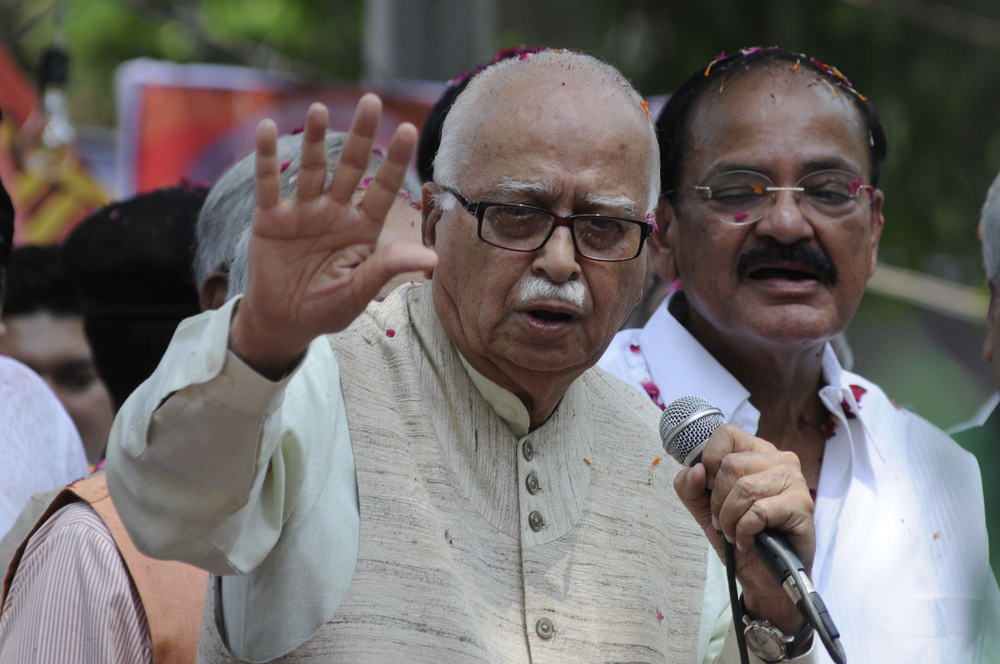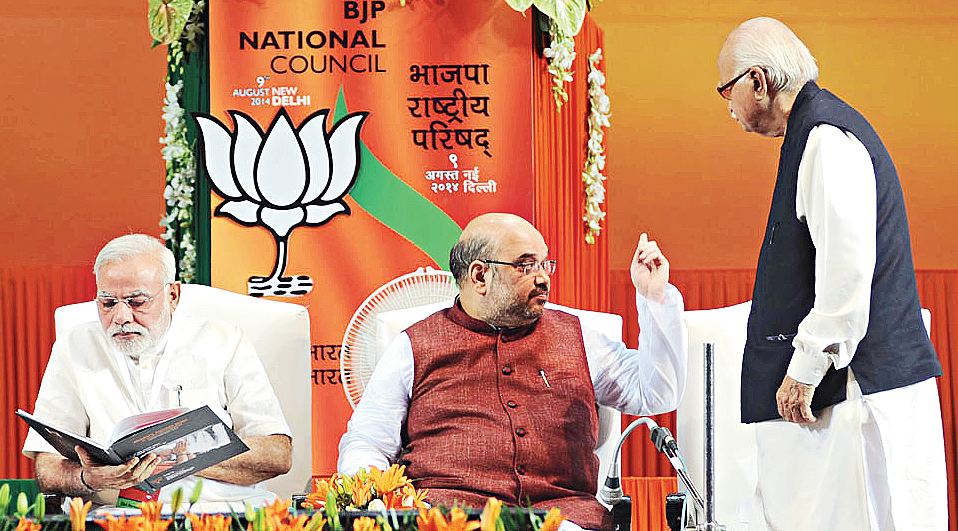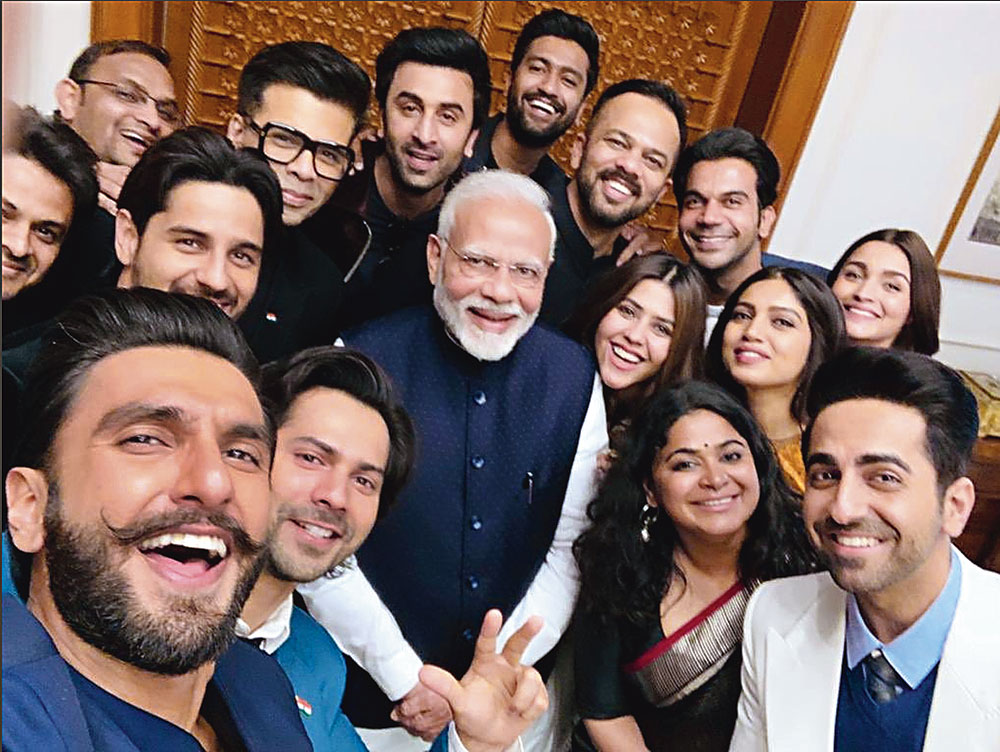Lal Krishna Advani — the grand patriarch of the Bharatiya Janata Party — issued a statement last week that many regarded as a stinging rebuke to the current leadership of the party represented by Narendra Modi and Amit Shah.
The ostensible reason for Advani’s sudden musings was the 39th anniversary of the BJP’s foundation day. It was on April 6, 1980 that members of the erstwhile Bharatiya Jana Sangh — which had merged its identity into the Janata Party in 1977 — re-emerged as a separate entity and renamed itself the Bharatiya Janata Party. Advani was a founding member of both the Jana Sangh and the BJP.
The party’s foundation day, Advani wrote, was an important occasion “for all of us in the BJP to look back, look ahead and look within.” And as one of the founders of the party, he deemed it his duty “to share my reflections with the people of India, and more specifically with the millions of workers of my Party...”
The core of his “reflections” would have seemed commonplace, even trite, in an earlier era. But at the end of Narendra Modi’s five-year reign, marked by divisiveness and bigotry, Advani’s words acquired a special resonance.
“The essence of Indian democracy,” he said, “is respect for diversity and freedom of expression. Right from its inception, the BJP has never regarded those who disagree with us politically as our ‘enemies’, but only as our adversaries. Similarly, in our conception of Indian nationalism, we have never regarded those who disagree with us politically as ‘anti-national’. The party has been committed to freedom of choice of every citizen at personal as well as political level.”
Since political opponents as well as ordinary citizens who dared to criticize the ruling ideology were routinely demonized as “anti-national” over the last five years, Advani’s statement was hailed by a number of Opposition leaders for obliquely attacking this undemocratic mindset.
Sudheendra Kulkarni, once a close aide to both Advani and Atal Bihari Vajpayee, went a step further. Advani’s statement, he exulted, was the “biggest intervention in the 2019 polls”.
Truth be told, it is nothing of the kind. Advani’s extolling of democracy and dissent is unlikely to make any impact — either on the psyche of BJP workers who have seamlessly transformed themselves into Modi bhakts or on those opposed to the Modi regime. And the reason lies in Advani’s own political trajectory.
Narendra Modi may regard himself as the biggest leader spawned by the Hindu Right, but it is L.K. Advani who is singularly responsible for turning the BJP into the spearhead of political Hindutva. Advani’s decision to take out a rath yatra from Somnath temple to Ayodhya in the autumn of 1990 marked a turning point in India’s political history. The rath yatra was aimed at whipping up the religious sentiments of ordinary Hindus and fusing it with the “cultural nationalism” espoused by the Rashtriya Swayamsevak Sangh to make a potent cocktail of religion and politics that had not been tried on such a scale in independent India. It was an assault on the founding principles of a self-chosen secular republic. The rath yatra was stopped in its tracks, but it gave a huge fillip to the Hindutva forces, eventually led to the demolition of the Babri Masjid in 1992 and brought the BJP to the centre stage of Indian politics.
Advani, committed to the RSS since the age of 14, is very different from Modi as a personality. He is mild mannered and has always regarded himself as benign, affable and avuncular. But these personal traits notwithstanding, he has been the principal architect — both ideologically and organizationally — of the BJP’s push towards Hindutva that views minorities and liberals with suspicion if not outright hostility.
The 1990 rath yatra was not a one-off mass mobilization tactic to expand the electoral fortunes of the BJP. It was part of a well-thought-out strategy that had been in the making for decades but found fruition under Advani’s leadership. The Jana Sangh, formed in 1951 by the former Hindu Mahasabha leader, Shyama Prasad Mookerjee, with the help of cadres loaned by the RSS (Advani being one of them), had also championed the cause of the “majority community” in post-Partition India. But it remained on the fringes of Indian politics and made use of the growing anti-Congressism from the late 1960s onwards to forge ties with other Opposition parties to expand its footprint. This process culminated in the merger of the Jana Sangh into the Janata Party in 1977.
But when the Janata Party fell apart over the “dual membership” issue (the socialists in the Janata Party wanted the erstwhile Jana Sangh members to give up membership of the RSS), they formed the BJP in 1980. It is significant that the old Jana Sangh was not resurrected. The new BJP, while maintaining links with the RSS, sought to be more centrist than its earlier avatar. Vajpayee was elected the first president and “Gandhian socialism” was its new creed.
That shift did not help. In the 1984 elections held in the aftermath of Indira Gandhi’s assassination, the BJP was reduced to a mere two seats. Following this debacle, the party set up a committee under K.L. Sharma to explore the reasons for the rout and suggest the way forward. It was concluded that the BJP must give up its flirtation with centrist positions and opt for aggressive Hindu nationalism. Advani replaced Vajpayee as party president in 1986.
After becoming president, Advani brought in several young men and women — Narendra Modi among them — to key organizational posts. He was also the prime force behind the BJP’s 1989 Palampur resolution which formally backed the Vishwa Hindu Parishad’s movement to “liberate” the Ramjanmabhoomi temple in Ayodhya and forge an alliance with the Shiv Sena in Maharashtra. The “moderates” in the party led by Vajpayee were against both decisions.
Advani was astute enough to realize that his image as a ‘hardliner’ would make it difficult for the BJP to attract new allies after the party was shunned following the Ayodhya demolition. He suggested the name of Vajpayee as the BJP’s prime ministerial candidate ahead of the 1996 elections. In the years that followed, Advani tried to tone down his hardline image, and helped Vajpayee run a successful coalition.
But the contradictions that lie at the heart of Advani’s persona and politics persisted. In 2002, it was Advani who forcefully backed Narendra Modi’s continuation as chief minister of Gujarat even though Vajpayee considered replacing him after the post-Godhra riots that rocked the state. Three years later, he confounded the party by travelling to Pakistan and extolling Mohammed Ali Jinnah — an act that cost him his job as BJP president. In 2009, in spite of the RSS’s misgivings, Advani was the BJP’s prime ministerial candidate and cut a sorry figure. By 2014, when he ought to have gracefully retired, he put up a fight against the nomination of Narendra Modi as the party’s principal campaigner and PM aspirant. Modi never forgave his one-time mentor. He relegated Advani to the Margdarshak Mandal, a consultative body of party elders — who were not consulted even once through his five years in power. Earlier this year, he bestowed the Bharat Ratna on Pranab Mukherjee but ignored Advani — even though Modi (and several other BJP leaders) owe their political career and the BJP-RSS their ascendance on the Indian political stage to Advani.
Advani’s supporters may argue that his latest statement comes from a genuine sense of anguish at the manner in which fissures and fault lines have been ripped open across Indian society by the Modi regime. Many a time, founders of a movement rue the eventual outcome of their labours at the hands of unworthy successors.
But this argument would have carried a little more weight if Advani had spoken out earlier. He remained studiously silent all through the last five years — never speaking out against the cow vigilantes, the mob lynchings, the attacks on Dalits, the assault on institutions, the tarnishing of political adversaries as “anti-nationals” on almost a daily basis.
Advani chose to speak out only after he was denied a ticket to contest the Gandhinagar seat. His past apart, the timing of his intervention, too, robs it of any significance. That is why rather than being a call to the BJP worker’s conscience, the statement will be remembered as Advani’s swansong — a forlorn and futile cry in the wilderness...












